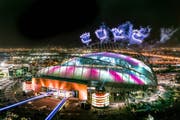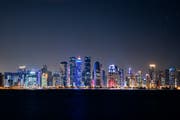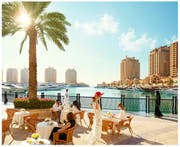Sustainability was at the heart of preparations for the FIFA World Cup 2022™, with Qatar delivering on the promise of the first carbon-neutral event in tournament history.
Here are ten ways Qatar reduced its carbon footprint in the lead-up to the first FIFA World Cup™ in the Middle East and the Arab world.
1. Compact tournament
Qatar hosted the most compact FIFA World Cup™ in modern history, with all eight stadiums close together and the longest distance between venues being just 75 km (from Al Bayt Stadium in Al Khor to Al Janoub Stadium in Al Wakrah). Fans and players stayed at the same accommodation and trained at the same location throughout the tournament.
2. No internal flights
Fans, players, and officials did not need to take any domestic flights upon arriving in Qatar. Visitors were never far from a stadium, training site, or tourist attraction, a significant departure from previous tournaments where fans and players often flew thousands of kilometres between matches.
3. Global Sustainability Assessment System (GSAS) certification
This rigorous certification process assessed various aspects, including design, construction, energy, and water usage, ensuring each tournament venue met stringent sustainability criteria. Notably, every stadium involved in the FIFA World Cup 2022™ achieved GSAS certification, highlighting Qatar's commitment to hosting an environmentally responsible event. Most notably, the Education City Stadium and Al Bayt Stadium achieved five-star ratings.
4. First fully dismountable FIFA World Cup™ stadium
The stunning Ras Abu Aboud Stadium, constructed from shipping containers and removable seats, provided an innovative blueprint for future tournament hosts. As the first fully dismountable FIFA World Cup™ stadium in history, the 40,000-capacity venue was slated for dismantlement after the event, with its parts repurposed for sporting facilities in Qatar and overseas. The shipping containers used for construction were originally employed to transport materials to Qatar.
5. Recycling at stadiums
All Qatar 2022 projects took waste segregation and management measures during the constructions to limit carbon emissions. Stadium sites diverted solid waste through recycling, with Al Janoub Stadium (90%) and Ahmad Bin Ali Stadium (84%) recycling the majority of waste generated during construction. Recycling systems were also in place during match days.
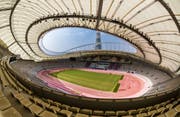
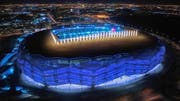
6. Sustainable sourcing
In the lead-up to the FIFA World Cup Qatar 2022™, Qatar's organising body, the Supreme Committee for Delivery and Legacy, collaborated with FIFA and the FIFA World Cup Qatar 2022 LLC to establish a Sustainable Sourcing Code. This code outlined minimum standards and benchmarks for suppliers and sponsors involved in the tournament, mandating strict adherence to environmental criteria.
7. State-of-the-art public transport
The new Doha Metro transported thousands of fans during the World Cup, utilising an electric metro system with regenerative braking systems to reduce its carbon footprint. Charging stations for electric cars were installed at various locations around the country in collaboration with KAHRAMAA, while electric scooters, bicycles, and a fleet of electric buses were available to transport fans between accommodation and tournament venues.
8. Green hospitality solutions
Sustainable hospitality solutions were at the core of the tournament, with accommodation being a crucial part of the fan experience. Through a partnership with the Qatar Green Building Council, the World Cup promoted green practices in the hotel sector, aiming to reduce its environmental impact and capitalise on efficient and responsible hotel operations.
9. Tree planting and greening the country
As part of the tournament's green legacy, tree planting played a significant role in stadium design and planning. Native trees and plants in stadium parklands and precincts contributed to a campaign to "green" the country, providing an opportunity to significantly reduce carbon emissions and leave a green legacy for future generations.
10. Al Kharsa'ah 800MW solar power plant
Lastly, the Al Kharsa’ah solar power plant aimed to reduce the country’s overall carbon footprint. Located 80 km west of Doha, the 800 MW solar energy plant reduced carbon dioxide emissions while limiting Qatar’s reliance on gas for power generation.
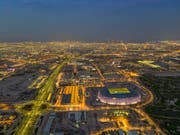

Not to miss
- item1
- item2
- item3
Things to know before travelling
-
Visas
Want to travel visa-free? Check if you qualify here.
-
Getting here
Planning your trip to Qatar? Check how to get here.
-
Travel tips
Make the most of your visit with our handy travel guide.
-
Getting around
From a dhow boat to our world-class metro, here’s how to easily explore Qatar.
Doha City Guidebook
Contact
